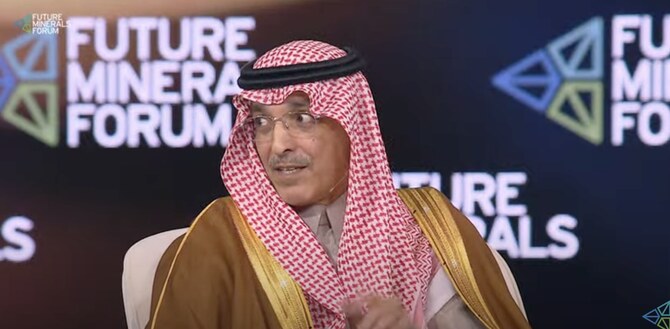RIYADH: The Gulf bloc must fast-track diversification, strengthen regional integration and deepen global ties in Asia, Africa and Latin America to cushion against the long-term impact of newly imposed US tariffs, a top risk strategist has told Arab News.
Mohammad Fheili warned that while the Gulf region has the capacity to withstand short-term turbulence, it remains exposed to the deeper ripple effects of a shifting and increasingly fragmented global trade environment.
President Donald Trump’s sweeping tariffs triggered a new wave of global trade tensions, sending financial markets into a tailspin and prompting urgent diplomatic responses.
With a baseline 10 percent tariff imposed on all imports and a staggering 125 percent levy on Chinese goods, the policy aims to combat what Trump calls unfair trade practices and to revive American manufacturing.
Key US trade partners, including the EU, Japan and South Korea, were also hit with elevated tariffs, drawing strong rebukes and pushing some nations to the negotiating table in hopes of exemptions or revised terms.
“If the region is to shield itself from the long-term consequences of Trump’s trade war, it must take decisive steps — starting now,” Fheili, who also works as an economist, told Arab News.
To avoid long-term vulnerabilities, he urged policymakers across the region to adopt a proactive, multi-pronged strategy.
This includes expanding partnerships beyond Asia to emerging markets in Africa and Latin America, strengthening intra-Gulf Cooperation Council economic integration, and boosting domestic demand by investing in wage growth, labor reforms and support for small and medium-sized enterprises.
“Strategic patience, economic flexibility and deeper regional integration will be essential to navigating what lies ahead,” Fheili said.
These measures, he noted, were essential in transforming the GCC from a strategically positioned bloc into a globally competitive economic force.
The market reaction to Trump’s tariff announcement was swift and severe: US indices plunged, with the S&P 500 falling nearly 10 percent in the first two days, while global exchanges echoed the selloff amid fears of a prolonged economic downturn.
“US markets initially spiked after hours following the tariff announcement on April 2, but the rally lasted only minutes before a sharp reversal sent markets tumbling,” Makram Makarem, senior director at Investment and Capital Bank, told Arab News.
“By the close on April 3, US indices were down by around 5 percent. The following day brought more turmoil, as China’s retaliatory measures triggered an additional 6 percent drop,” he added.
“After some breathing room on April 7 and into the morning of April 8, markets staged a modest rebound. But later that afternoon, Trump’s announcement of even higher tariffs on China triggered another wave of selling — though losses remained above Monday’s lows,” Makarem said.
Trump later introduced a 90-day pause on most global tariffs but simultaneously hiked levies on Chinese goods to 125 percent.
“Markets reacted positively to the pause, with the S&P 500 surging 9.5 percent as investors welcomed the temporary relief despite rising friction with China,” Makarem said.
Trump has insisted the tariffs could become permanent unless trade imbalances are corrected, casting a long shadow over global supply chains and export-driven economies.
While the GCC countries were spared the harshest penalties, the ripple effects — especially through weakened global oil demand and investor caution — pose indirect risks to the region’s economic outlook.
“While the GCC has so far managed to stay out of the direct line of fire, it cannot avoid the indirect exposure to global economic turbulence,” according to Fheili.
“In the short term, GCC states may be able to absorb the initial shockwaves. But if this trade war persists, the structural weaknesses of the region’s economies will be tested — and possibly exposed,” he said.
Short-term resilience
GCC economies have built a notable buffer against immediate shocks through a decade of reforms, fiscal discipline and diversification efforts.
National strategies such as Saudi Arabia’s Vision 2030 and the UAE’s economic transformation agenda have laid the groundwork for expanding non-oil sectors such as tourism, logistics and financial services.
The region has also strengthened trade ties beyond traditional partners, deepening economic relationships with fast-growing markets in Asia and Africa. Sovereign wealth funds and robust central banking systems further support macroeconomic stability.
Moreover, President Trump’s recent tariff policy notably spares oil and gas imports — offering near-term relief for the GCC’s energy-dependent economies and preserving their most critical revenue stream amid rising global uncertainty.
“Countries like Saudi Arabia, the UAE and Kuwait have built significant reserves through sovereign wealth funds, providing liquidity and investment continuity even during global slowdowns,” said Fheili.
Turning to Saudi Arabia, the analyst said that the Kingdom is well-positioned to benefit from shifting global dynamics.
“In a fragmented trade environment, energy security becomes even more critical. Saudi Arabia’s vast oil and LNG resources remain attractive to countries seeking reliable long-term partners, potentially locking in stable export relationships,” he said.
Long-term trade turbulence requires structural overhaul
As the global trade environment shifts toward deeper fragmentation, the GCC faces mounting long-term challenges that could erode the region’s economic resilience.
While the initial shock of US tariffs may spare the GCC from direct impact, Fheili warns that prolonged trade conflict poses far-reaching risks — especially for nations still reliant on hydrocarbon exports and global capital flows.
Indeed, weakening global industrial output could shrink demand for petrochemical exports, a major revenue stream for Saudi Arabia and Qatar. Tightened US export controls may also complicate technological and defense cooperation with American firms, further entrenching strategic vulnerabilities, according to the expert.
Despite visionary plans such as Saudi Vision 2030, many structural weaknesses persist.
“Diversification is still in its early stages,” Fheili said. He added: “The non-oil economy, while growing, isn’t yet mature enough to offset a drawn-out global slowdown.”
The region’s reliance on imports — from food to industrial equipment — adds another layer of exposure. If global supply chains continue to strain, the GCC could face inflationary pressures and shortages.
Additionally, China, the Gulf’s largest oil customer, remains deeply entangled in the trade war crossfire. A slowdown in Chinese energy demand would reverberate across the Gulf’s public finances, Fheili said.
Fiscal disparities across the bloc could also widen the gap between nations including Saudi Arabia and the UAE — armed with sovereign wealth reserves — and more vulnerable economies such as Bahrain and Oman. Meanwhile, intra-GCC trade remains modest, limited by overlapping sectors and weak integration.
“A more connected and cooperative Gulf economic bloc could serve as a buffer against global headwinds,” said Fheili, adding: “The time is ripe to turn the GCC from a strategic alliance into a true economic force.”
Strengthening domestic demand and supporting small and medium enterprises will also be crucial in buffering external shocks. Furthermore, leveraging strategic assets — such as gold reserves, energy logistics and emerging green technologies — can provide the GCC with an edge in a shifting global order.
According to Fheili, one of the most underused tools may be gold. In the Gulf, it is more than a hedge — it is heritage, trade and untapped financial strategy. As global faith in fiat currencies wavers, GCC central banks can treat gold not just as a stabilizer, but a strategic asset that reinforces financial sovereignty and hedges against geopolitical volatility.
“Resilience must evolve from a cushion into a capability,” he added.































